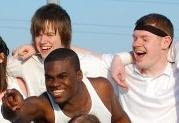The project began with just Anderson and I. We had come up with a few ideas but had not finalised anything by this point. Tim then joined our group and we continued in the ideas generation stage with me being the director, Tim being the producer and Anderson being the director of photography. We spent a lot of time going through a lot of ideas and it was at this point I knew that the group I was now working in was made up of very different film makers. I had to learn quickly to adjust to both person’s ideas and individual style. This was a difficult thing to achieve and it was something that took a lot of time.
As the director, I took it upon myself to be involved in as much of the project as possible. I made sure I wrote the scripts and did the storyboards so that I would have the best possible understanding of the film.
I had wanted to improve my script writing and story development for this project. I knew Tim was very good at this and I knew that I needed to get as much feedback as possible. I ended up writing 7 drafts of the script all of which had significant changes. I also gained a lot of feedback and I feel that the final draft of the script was very complete and a massive improvement on my previous dramas. During this stage of production, I learnt a lot about story structure and story development techniques.
Progress went very well during pre-production. We were ready for our first and most challenging shoot in which we had to create the illusion of an endlessly white room. Here I learnt the importance of vigorous testing. We were able to achieve this very difficult look due to the massive amount of testing and research we had done leading to this point.
After we had done this shoot, the group began to split and start working on our own projects and the design futures module. This began to snowball and sure enough we began to run out of time. Managing all 3 projects was becoming very difficult for myself and the group as we all had differing priorities. This caused a slump in our work rate for the film for a few weeks and our final shoot days were pushed back.
With our final shoot days pushed back, it turned out that our male actor would be unable to make any shoot dates before the deadline week. This meant we had to find a way to shoot around him. This really pushed my skills as a director as we had made a very complex story and it was up to me to work out a way to shoot the rest of the film without our actor with it still wrapping off all of the elements of the film. As stressful as this became for me, I was able to work out a way to shoot around the actor using techniques inspired by russian art house films and using the mise en scene we had already established earlier in the film.
During the shoots, I felt a lot more relaxed than I usually did. As a group we worked fantastic during the shoots. Tim focused on the organisation and took all of those pressures off of me and Anderson focused on making the shots look the best they could be. I was able to focus completely on the actress and the story telling aspects of the film. This was a new experience for me as usually I am worrying about the organisation and the cinematography as well as the direction. I learnt a lot about true direction during the shoots. At the beginning of each shoot, I had time to sit down with the actress and brief her on what general mood I want her to portray for each scene. When it came to doing the shots, I was able to refer back to our briefing session a lot of the time and this turned out to be a very successful technique. We all had a great trust in one another and this made for a smooth, fun and efficient production.
I learnt that being a director, you get asked a lot of questions. I had watched an interview with Spielburg where he had said that “The hardest thing about being a director is knowing what you want”. This proved to be a correct statement. I had to make sure that I always knew the story perfectly so that when I would get asked questions, I could answer without hesitation. I would force myself into a state where every decision that I made would be one with absolute certainty. However, I believe that I still need to develop my skill in knowing exactly what I want but I recognise that this is a technique that comes with a lot of experience.
The editing of this film was left very late and I feel that is where it’s downfall lies. There was not enough time to develop the sound to the level where I felt it needed to be. Tim, Anderson and I sacrificed sleep in the last week before deadline to make sure that we could get the film to a point where it met our high standards. This was a challenging time and it was important for all of us to keep motivated. Even under the stress, we were all able to keep spirits high and work at our hardest. This made me realise how far we had come as a group. By this point we learnt each others behaviors and were able to recognise when someone was feeling stressed. We had developed a fantastic working relationship and were able to keep ourselves motivated and get the work done.

0 comments:
Post a Comment